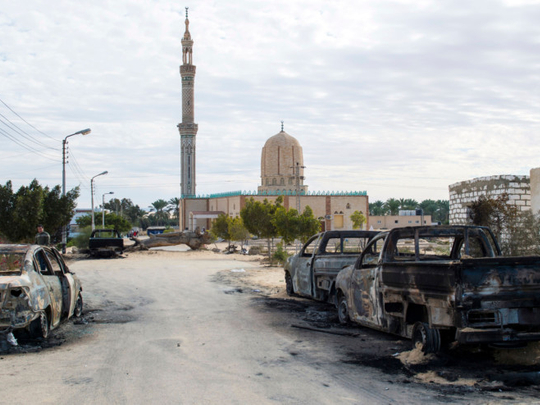
The assailants, up to 30 of them, some wearing masks, converged in pickup trucks outside the mosque as worshipers were attending Friday prayers and the Imam was about to begin his sermon. Then they entered the House of God, set off a suicide blast and proceeded to gun down the survivors who ran for their lives.
The assailants then walked around among the fallen — 27 of them children — shooting those who appeared to be breathing. When the carnage ended, more than 300 people were killed. In Rawdah, the small hamlet off the road that cuts across the northern part of Sinai, where the massacre took place, almost no one was untouched by the horror.
After all is said and done, we are left with one seminal question: What demonic mind are these assailants possessed of, possessed by, that allows for such wanton bloodletting? If it is true that the attackers were inspired by Daesh (the self-proclaimed Islamic State of Iraq and the Levant) — and we were told in news reports that some of them held aloft black Daesh flags, presumably to advertise their ideological affiliation — then how was this perverted ideology able to take root, as it did initially in Iraq and Syria?
In this regard, let’s not forget first that Daesh militants are the product of the process of socialisation in those two countries in the Levant, countries that began their careers at one time as Baathist police states, for generations ruled by repressive regimes whose elites relied on coercion, terror and violence to govern their citizens. And political repression is not a power localised only in the sphere of politics. Rather, it is a power that shapes citizens’ self-definitions via the ethic of fear — and not just fear of authority, but fear of innovation, fear of originality, fear of spontaneity, fear of life itself.
All of which leaves individuals in society feeling that they inhabit a subverted objective reality where they cannot conjure hope, even in their imagination — feeling dislocated, as though they and their world are falling apart. In that kind of subverted reality (a reality that social critics like the French philosopher Michel Foucault called “a domain of objects and rituals of truth”), there always comes a point where the regime will either break these individuals’ will, cowing them into submission, or conversely turn them into human beings burning with rage at their sense of helplessness.
Thus saddled, they go looking for some primordialist truth that will bring them relief.
What I am arguing here is that when we seek to understand the demons, lurking within these men, that propel them to act with such unspeakable brutality, we have to wonder if their political culture, of which they are a product, was complicit. We have to look at that inter-psychic tension that exists between these men and the polity that brutalised them — and brutalised them to a point where they became impervious to the restraint of emotions. Think of the aloofness they evince towards the cold-blooded nature of their horrific acts!
Let us then, recognising the dialectic that binds these individuals and the political culture that socialised them in the first place, not absolve, say, the Baathist regime in Iraq, led by former president Saddam Hussain, or for that matter in Syria, originally led by former president Hafez Al Assad, and currently by his son, President Bashar Al Assad of blame for indirectly forcing their citizens into ideal recruits for a movement like Daesh.
Ideal recruits indeed. For at the core of Daesh’s “ideology” is the apocalyptic vision that divides the world into ‘us’ and ‘them’, good and evil.
True, individuals are born with free will and open minds, and they should know better than to join this group, or to fall for its perverted interpretation of Islam. Yes, true — but not when these individuals had been robbed of the former and denied free expression by the latter. These folks are, in effect, cut to measure, ready to fall into the garb and glove of the bloody ways of Daesh, lethally meshing into its cold-blooded fantasies.
So when will it all end? When will Daesh slink into oblivion, no longer able to prey on its followers’ sense of being victimised by their elites and rendered rootless by their mutilated habitat?
As soon as there is a meeting of minds, an alignment, as it were, between the personal and the political forces in our societies.
Then, and only then, will the world of Daesh come to an end, with whimper — and become a mere footnote in our history books.
Fawaz Turki is a journalist, lecturer and author based in Washington. He is the author of The Disinherited: Journal of a Palestinian Exile.










